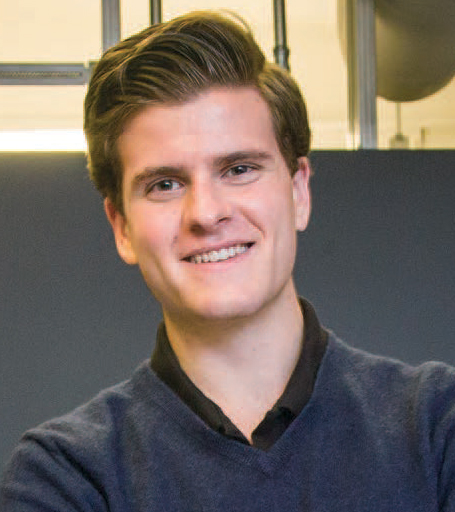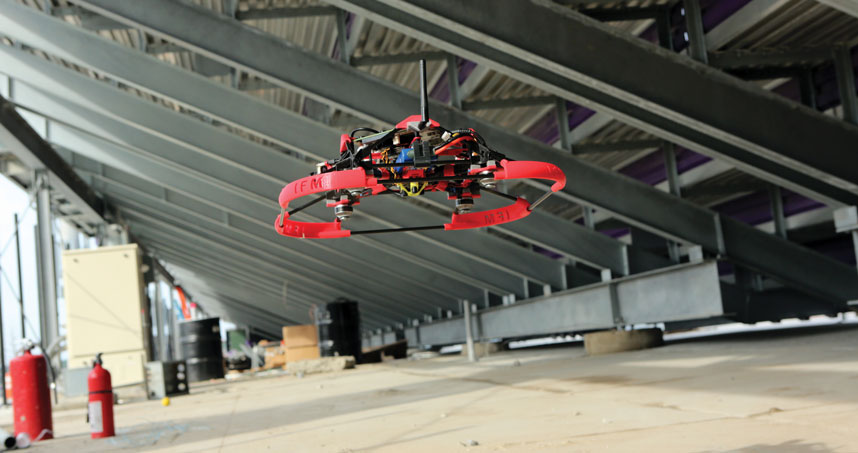Startup Takes to the Air
Senior computer science major Marc Gyongyosi credits his Northwestern experience for helping his robotics startup, Intelligent Flying Machines, get off the ground and up to speed.
Marc Gyongyosi has always had a passion for things that fly. At age 15, he built a full-scale Boeing 737 flight simulator from scratch, complete with a cockpit, electronics, and software.
But it wasn’t until he took Assistant Professor Brenna Argall’s EECS 301: Introduction to Robotics Laboratory course as a first-year student studying computer science that he realized his love of flight and technology could become more than just a hobby.
“Professor Argall and EECS 301 opened my eyes to the world of robotics,” Gyongyosi says. “I saw the possibility of combining smart software, like machine learning, with hardware, like robots, so the machines could make decisions and act on their own.”
In 2014, Gyongyosi founded Intelligent Flying Machines (IFM), a data analytics startup that uses small, lightweight flying robots to perform data capture indoors. Many drones rely on GPS for navigation, which limits their uses to outdoor spaces. IFM’s flying robots don’t suffer from this limitation. They operate and gather data autonomously using onboard cameras, the company’s proprietary computer vision algorithms, and NVIDIA graphics processing units (GPUs), high-performance computer chips that allow artificial intelligence applications like IFM’s vision software to run on small and compact systems.
Accuracy, Insight, Efficiency

Gyongyosi believes IFM’s technology has widespread application, but has chosen to tackle the warehouse inventory space first. Highly manual and slow, current warehouse inventory management approaches cost companies billions of dollars every year due to human error.
“Robotics are moving toward smaller and smarter models that work collaboratively with humans by adapting to changes in the environment,” says Gyongyosi, who spent two summers building collaborative robots at the BMW Group Research and Innovation Center in Munich, Germany. He continues, “IFM embraces this collaboration trend with robots that provide safety, reliability, and accuracy to warehouse inventory processes and reduce the strain on factory workers caused by doing repetitive tasks.”
IFM’s robots autonomously navigate warehouse aisles, scanning large-scale inventory orders faster and more accurately than humans. Warehouse owners can easily integrate the data generated through IFM’s analytics platform into their existing inventory software, revealing insights into inventory status and alerting them to possible errors.
“Our robots aren’t going to replace people, but they will make processes in the warehouse more efficient,” Gyongyosi says. “Nobody wants to spend time walking around searching for things the robots can locate much faster.”
A Home in The Garage
Before taking up residency in The Garage, Northwestern’s 11,000- square-foot hub for entrepreneurship and innovation, Gyongyosi flew his prototype robots on Saturday mornings in his dorm. His neighbors in Kemper Hall were less than thrilled.
Fortunately for them, after The Garage opened in 2015, Gyongyosi found a home where he could develop his idea for Intelligent Flying Machines and transform that vision into a burgeoning startup. “The Garage has been absolutely instrumental in helping build the company,” Gyongyosi says. “We have a wealth of essential resources at our disposal.”
These resources include IFM’s workspace, available 24/7, and access to valuable professional services like patent lawyers. “Family dinners” encourage networking with Northwestern alumni entrepreneurs who have launched successful startups of their own. The Garage’s summer accelerator program, Wildfire, also allocated to IFM five interns to boost its technical and business development workforce.
Through The Garage, Gyongyosi connected with Rich Padula (’84), a veteran enterprise software entrepreneur and adjunct lecturer in Northwestern’s Farley Center for Entrepreneurship and Innovation. Padula and Gyongyosi meet weekly to discuss all aspects of business development, from fundraising strategies to product management structure to marketing.
Padula, a member of the McCormick Advisory Council, believes IFM is on a path to success. “So many startups fail to execute the vision they promised. They drum up interest but don’t deliver any value,” he says. “IFM is at a critical juncture, and Marc’s priorities are correct. He’s focused on proving that Intelligent Flying Machines is viable and robust enough to hold up in industrial environments, essential to capturing that first customer.”
From NUVC to TechCrunch
In June 2016, Gyongyosi presented his automated inventory solution to Chicago-area entrepreneurs and venture capitalists as part of the Northwestern University Venture Challenge (NUVC), the University’s largest business plan competition. IFM finished among the contest’s 11 finalists.
Three months later, Gyongyosi took to an even broader, international stage: TechCrunch Disrupt in San Francisco, one of the world’s preeminent startup competitions. Gyongyosi pitched IFM’s analytics platform and business plan to a panel of leading entrepreneurs, investors, and technologists, as thousands of others around the world watched via live-streaming video.
Gyongyosi believes his experience at NUVC prepared him for the attention and expectations at TechCrunch’s renowned competition. “The Northwestern Venture Challenge was one of our first business plan competitions,” Gyongyosi says. “It was a great opportunity to practice our pitch and assess our approach before we presented at TechCrunch Disrupt.”
Preparing for Takeoff
Gyongyosi and his IFM partners, computer science PhD students Siddarth Jain (MS ’15) and Nathan Matsuda (’08, MS ’15), are working toward achieving four major goals in 2017: grow the team with new hires and a permanent company space, develop 30 next- generational robots with improved functionalities, expand testing through increased corporate partnerships, and continue work on bringing the startup’s first commercial product to market.
While Gyongyosi will step away from campus following his graduation in June, he believes his Northwestern experience will leave a lasting impact on the company. “The Northwestern community has greatly influenced how I think about IFM and plan to run it in the future,” Gyongyosi says. “Northwestern’s hands-on approach to education and its supportive professors who conduct research with students have given me four years of experience identifying problems and coming up with solutions. In the end, that is what has benefited me the most.”
Learn about the latest from IFM at our Ideas at the Intersection website

